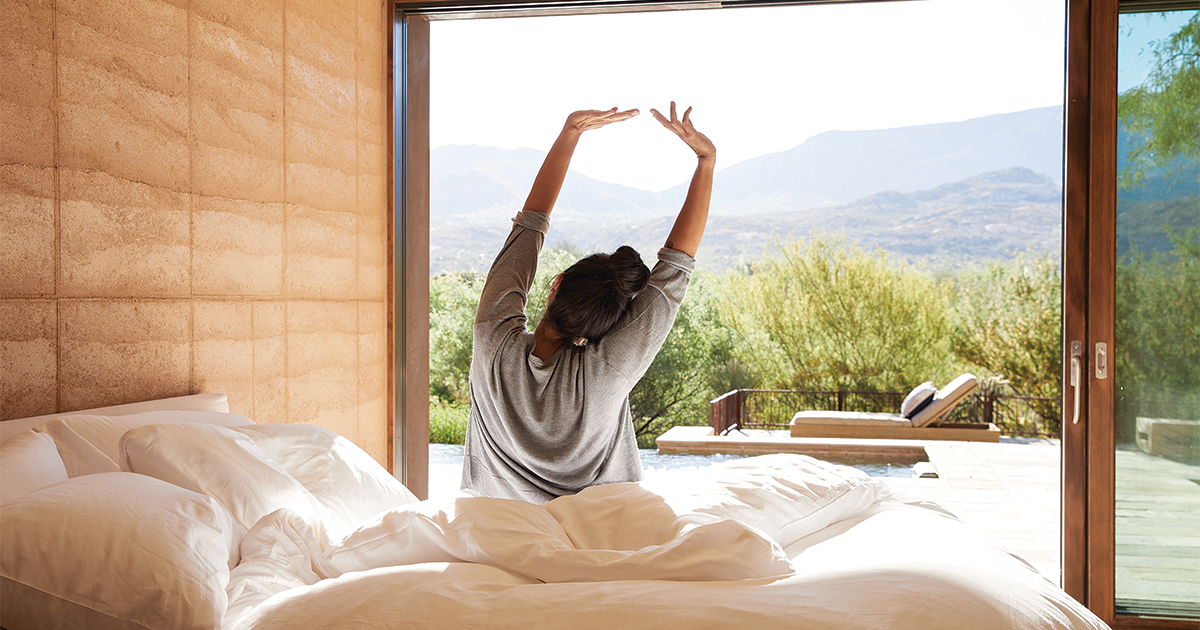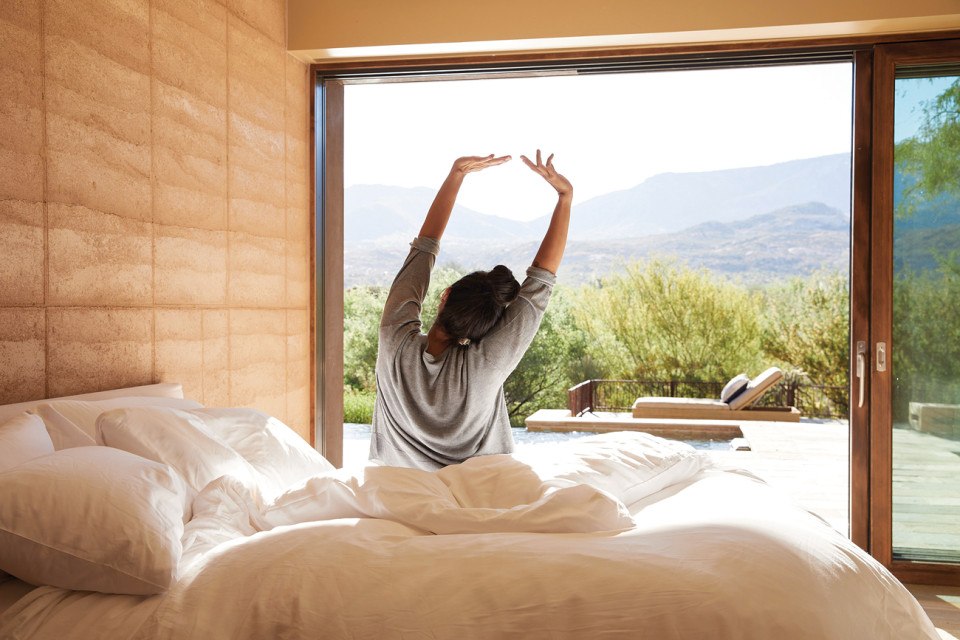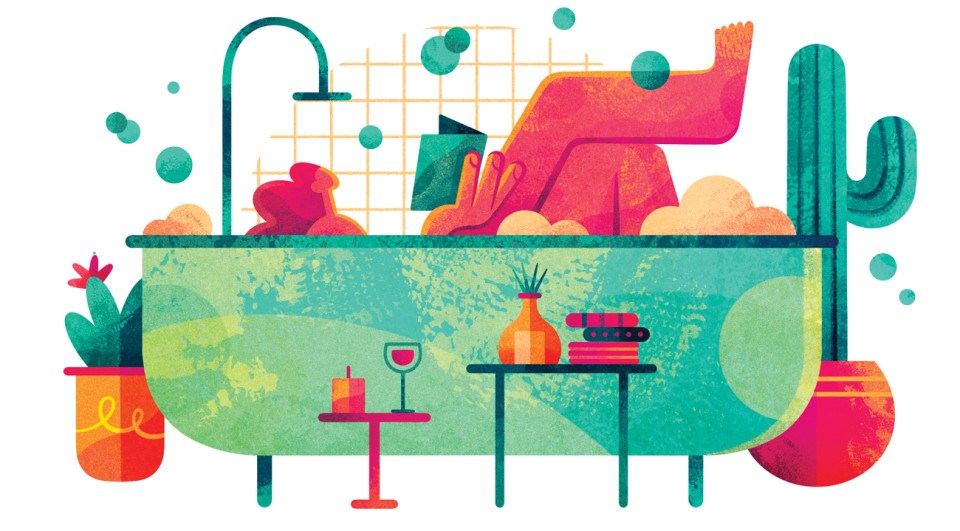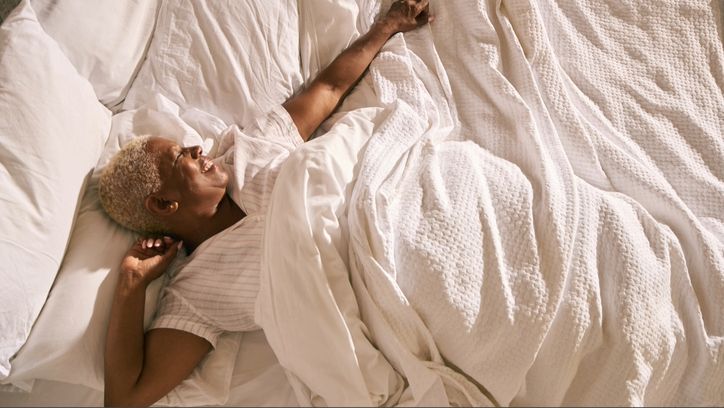Desperate for Rest? A Sleep Retreat Might Be Just What You Need

Longform
The pandemic wreaked havoc on our REM cycles, and there’s still so much to be stressed about in the world. Like millions of other Americans, I was tired of feeling so dang tired all the time. In search of sweet, sweet slumber, I hopped on a plane and became part of the growing trend of sleep tourism. Here’s how it went.

Morning views at Miraval Arizona Resort and Spa / Photograph courtesy of Miraval Arizona Resort and Spa
I showed up to a sleep retreat exactly how you might imagine: utterly exhausted. I was at my wits’ end, having felt bone-tired for over a decade.
A little backstory: During my college and grad school years, I suffered frequent bouts of fatigue, which my doctor said were likely due to low iron levels. But other than being told to take an iron supplement, I was never given additional insight into how I might remedy this issue. I didn’t have it in me to seek further tests; I was just so tired of everything, including getting blood work done. Assuming that my chronic exhaustion might be something I’d have to navigate for the rest of my life, I decided I’d try to enact some general lifestyle changes: eat more iron-rich food, take a daily vitamin, exercise often, and not jam-pack my social calendar.
My efforts worked for a bit. By my late 20s, waves of exhaustion would only hit a few times a year, but I adapted to a life that included needing about 10 hours of sleep per night in order to feel like a rested, functioning adult. (Impractical, I know.)
Things took a turn for the worse when the pandemic hit, as my anxiety surged during lockdown. Fears about contracting COVID, the economy, my loved ones’ health, and being stuck inside kept me up at night. Plus, my (now) husband and I were three months shy of a wedding we’d been meticulously planning for a year and a half, but that was suddenly not happening that June. We pushed it out to the following summer, still uncertain if restrictions would be eased by then, and thus I spent the entire year sad, stressed, and struggling to sleep well.
Turns out, I developed what researchers have now dubbed “coronasomnia,” which is just what it sounds like: insomnia brought on by COVID-related worries. Folks in my social circle would tell me to just take melatonin, CBD, or an edible. (No thanks!) Even though studies have shown that two or more hours of screen time before bed can hinder your natural evening melatonin surge, turning off the TV and putting my phone down for the night at 8 p.m. seemed … unrealistic in this day and age. Is there an end in sight to my bedtime blues? I anxiously wondered every night. Or is this my new normal?
•
I wasn’t the only one tossing and turning with worry. In the National Sleep Foundation’s 2020 Sleep in America poll, more than a third of adults reported they weren’t hitting the recommended hours of sleep (seven to nine) and felt tired during most weekdays. This, the respondents noted, negatively affected their mood, work performance, mental sharpness, and relationships with family and friends. And according to a March 2021 survey conducted by the American Academy of Sleep Medicine, the top disturbances adults experienced during the first year of the pandemic included trouble falling or staying asleep, decreased nightly and worse quality sleep, and more disturbing dreams. The likely culprit? Increased levels of cortisol, our natural stress hormone that’s released whenever we perceive danger and that prepares the body for the fight-or-flight response. “We are in a high-alert state; our brains busily preparing our bodies for dealing with disaster, even if it doesn’t fall into our direct path,” wrote Eleanor Morgan in an April 2020 WIRED article, fittingly published on the magazine’s website at 1 a.m.
During and in the aftermath of the pandemic, we’ve been living through fraught times, from the turmoils of climate change and inflation to political upheaval, global conflict, and rampant gun violence. With so much to be anxious about, it’s no wonder that depression rates in the U.S. are skyrocketing and that, according to Google Trends, searches for “sleep” hit an all-time high in 2023. (These two things are connected: The NSF’s 2023 Sleep in America poll found a strong link between poor sleep health and mild to greater levels of depressive symptoms.)
Cycling through the emotions that result — like fear, anger, and despair — plays a major role in our sleep quality, says Thanuja Hamilton, a board-certified sleep medicine specialist with Advocare Sleep Physicians of South Jersey. “The fluctuations of emotions give us a feeling of unrest, making it difficult for the brain to wind down and allow you to fall asleep peacefully. Even if you do fall asleep from exhaustion, your brain is still firing off emotions that can prevent you from going into a deep, well-rested sleep.”
Last year, I finally consulted a new doctor, who ordered me blood work (normal) and an at-home sleep study (also normal). Stress and doing too much, he said, were likely to blame, and he recommended I download the Calm app and use it to ease into slumber every night. “Life has certainly not gotten easier or more relaxing since the pandemic,” says Philip Gehrman, a professor of clinical psychology in psychiatry at the University of Pennsylvania’s Perelman School of Medicine. “And we’ve gone back to our pre-pandemic levels of busyness, so many people don’t have enough time to relax and wind down to allow sleep to happen.”
Yet again, I felt defeated. Stress and activity are regular parts of life, which I took to mean that I’d have to accept being constantly tired. I thought about what Philly-area native Caroline Dooner wrote in her 2022 book Tired as F*ck: Burnout at the Hands of Diet, Self-Help, and Hustle Culture: “Life is exhausting. And we do not live in a culture that supports and allows for healing from that exhaustion. We live in a culture that sees hyper-productivity and exhaustion as a badge of honor.”
I was in need of healing, of respite, of an adequate refresh — and no app was going to provide me with those. Desperate for real, lasting solutions, I researched and discovered that a thing called sleep tourism is growing in popularity. Because many people are experiencing acute sleep troubles, hotels across the globe have started offering retreats, programs, and amenities aimed at helping guests learn how to naturally calm down in the evening, get a restful night’s sleep, and avoid scrolling social media or binging a show instead of hitting the hay, a phenomenon now known as “revenge bedtime procrastination.”
To (hopefully) help me achieve uninterrupted REM and provide tips and techniques to bring back to my bedroom, I ventured to Miraval Arizona Resort and Spa in October 2023. The Tucson outpost — the brand also has properties in the Berkshires and Austin — employs Leah Ann Bolen, a certified dreamwork and sleep science coach who runs lectures, workshops, and private sessions year-round. Even better: The resort facilitates true R&R with its 360-degree approach to wellness — from an array of fitness, mindfulness, creative, and hands-on activities to nutritious, seasonal fare, restorative spa services, and cloud-like bedding in every room — so you can unwind even before turning off the lights for the night.
On the afternoon I arrived, I immediately felt a sense of peace — there is something about leaving the chaos of the city and retreating to a secluded resort in the middle of the desert. A change of scenery, I thought, was a solid first step in my quest for rest. I took the evening Dream Yoga for Sleep class, a slow-flow, restorative practice focused on putting you into a state of relaxation. The gentle poses, attention to breath, and aromatherapy seemed to calm my nervous system. Stimulating different pressure points in our feet could help with fatigue, restlessness, and physical and emotional tension, the instructor said. I slept great that night, better than I had in a long time, and felt rejuvenated the next morning.
•
My second night at the retreat, though, was rough. Even though I had enjoyed a blissful neck and scalp massage at the spa and eaten dinner at 6 p.m. — giving my body adequate time to digest the food, which affects sleep — I was up several times throughout the night, annoyed and uncomfortable despite the super-comfy bed. It seems my problem was … being a Philly sports fan. In the hours after dinner, I found myself on the emotional roller coaster that was Game 4 of the 2023 NLCS, which, if you’ve blocked it out of your memory, saw the Phillies losing and the Arizona Diamondbacks tying the series.
According to Gehrman, these kinds of high-stakes sporting events get our adrenaline pumping and can activate both our arousal system — which can be triggered by emotions like excitement, anxiety, and fear — and our sympathetic nervous system (a.k.a. our fight-or-flight response), which can result in elevated heart rate, increased sweating, and brain activation. “Increased arousal can make it difficult to fall asleep, but then when we are asleep, it may persist and interfere with the quality of our sleep and/or increase the likelihood of waking up and having difficulty getting back to sleep,” he says.
I tried to keep in mind a bit of information Bolen had offered in her lecture “Sleep Well: Rituals for Better Rest” earlier that day. Most people experience four to six sleep cycles per night, she had said, and it’s likely that you’ll wake up between cycles. The biggest reminder you can give yourself during one of these awakenings, she said, is “I didn’t ruin the night.” By telling yourself it’s okay that you’ve woken up, you’re changing your perspective and retraining your brain in the process. Easing your mind will take time — it’s not going to happen overnight! — but the more you tell yourself waking up is not a catastrophe, the more likely it becomes that your mind will start believing it.

Illustration by Chanelle Nibbelink
Despite feeling a little groggy the next morning, I went into my third and final full day at Miraval with an open mind (and whatever natural energy I could muster — I don’t drink coffee!). Following a nutritious breakfast and an amazing facial at the spa, I sat in on a workshop of Bolen’s called “A Return to Sleep.” One of the first things she said seemed like it was tailored to me: Don’t judge how well you’re sleeping by how you feel in the morning. “Many of us can wake up with sleep inertia — or feeling groggy or disoriented upon waking — even if we got a ‘good’ night’s sleep,” she said. (A weight lifted from my mind.)
She also explained some of our inner mechanisms, including our sleep drive and our circadian rhythm. The former, she said, is like a rubber band that becomes more taut over the course of the day so that we’re adequately prepped for rest when bedtime nears. Every time we nap (especially for longer than 20 to 30 minutes), that tautness loosens, which interferes with our nighttime sleep. As for the latter, Bolen said we can best support our circadian rhythm by waking up around the same time daily — swaying our wake-up time by an hour or more, she said, will disrupt it.
Bolen also offered that being exposed to sunlight at the start of the morning “is a direct cue for our inner timekeeper to know we are supposed to be awake, and helps keep that inner timekeeper properly functioning.” She recommended getting outside for 15 minutes within the first hour of rising every day. This is something I still struggle with, but I do find I feel more alert in the mornings that I’m on daycare drop-off duty versus the ones when I go right to my laptop upon waking — such an easy trap to fall into as a WFH’er.
After a floating meditation session (in which I gently rocked inside a suspended silk hammock as I listened to the relaxing sounds of crystal bowls) and a Phillies win, I drifted off into sweet reverie with ease — and awoke feeling not only refreshed, but hopeful for my return home.
•
It has been over a year since my Miraval visit, and I do believe my sleep health — the quality of and approach to my rest — has improved.
I’ve come to realize that my biggest problem was the amount of pressure I was putting on myself to either fall asleep in a timely manner or to get back to sleep if I woke in the middle of the night. I used to sob in frustration when I’d wake up at 2 a.m., which ultimately prolonged my time awake. Now, if I wake in the middle of the night, I try to keep my brain disengaged — to avoid activating my arousal system, as Gehrman mentioned — and keep my eyes closed, rather than grabbing my phone and scrolling through squinted eyes.
I also have stopped checking the time, a tip Bolen offered in one of her lectures. “Seeing what time it is when you wake in the middle of the night and focusing on how much time you have left to sleep puts undue pressure on ourselves. It’s a gift to your mind to not know the time,” she had said — and I took that to heart. Doing so has prevented me from being awake from, say, 2 to 5 or 6 a.m. — a frequent occurrence during those initial pandemic years. Good riddance, witching hour!
I’ve also learned that I still have a tough time shaking stress-induced adrenaline, no matter what practices I implement. As I wrote this, I felt overwhelmed, and had for a few days. (I was on deadline, and once again the Phillies were causing their fan base postseason distress.) It had all been interfering with my ability to fall asleep once I got into bed. My eyes would start feeling heavy by 9:15 p.m., but once I made my way up to my bedroom, I was unable to drift off for the night until closer to midnight.
“When you’re on the sofa watching TV, there is no pressure to sleep. You are relaxed and comfortable,” Hamilton tells me. “For people who struggle with sleep, it might trigger performance anxiety once you get in bed. There is pressure to sleep, and it becomes learned behavior to become alert as soon as you get in bed.” Again with the pressure: my Achilles heel!
In these moments, I try to give myself grace and remind myself not every night will be like this. “Keep in mind that it’s temporary,” Gehrman told me when I asked him about trying to recover from acute exhaustion. “For a few days, try to give yourself a few extra minutes to get going in the morning, and don’t plan important meetings at the time of day when you tend to feel most tired. If you are usually getting a decent night of sleep, it’s easier to tolerate these short-term periods of sleep loss.”
Most importantly, I’ve done my best to treat my bedroom like a sleep sanctuary, at Bolen’s recommendation. “Your bedroom should soothe you and ready your whole self — body, mind, and soul — for sleep,” she said. To do so, I bought a new mattress (we were due for one anyway) and quality sheets, and introduced a white noise machine. I also stopped reading in bed — if I pick up a book at night, I do so on my living room couch. In this way, I adhere to the “you should only use your bed for sleeping” mantra, and the psychological association I’ve worked to create has reduced — though not entirely eliminated — my struggles with shut-eye.
And while I haven’t yet done so myself, I recognize — especially after having a baby — the importance of implementing a pre-bedtime routine, as it can have a calming effect on your mental, emotional, and physical states. Hamilton says you should figure out what soothes you (it’ll be different for everyone) and replicate that process around the same time every night. Her suggestions include drinking chamomile tea, using essential oil roll-ons or diffusers, journaling, and taking a warm bath or shower.
As I put my daughter to bed one night, I was struck by a sentiment Bolen had relayed in one of her lectures: At some point in each of our lives, without notice, we stopped getting tucked in — and we’ve been left to our own devices to settle ourselves to sleep ever since. Sure, sleep is one of the most natural needs of our lives — it’s literally biological — but for many of us, it doesn’t always come naturally. Maybe the journey toward getting better sleep doesn’t have to be such a frustrating ordeal, though. Maybe it starts more simply: learning how to tuck ourselves in.
Published as “The Best Rest of Your Life” in the 2025 issue of Be Well Philly.
link






